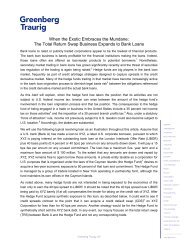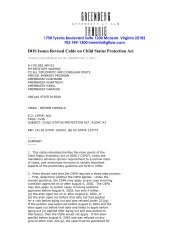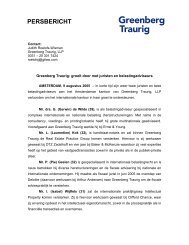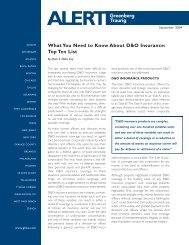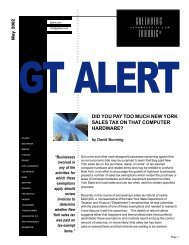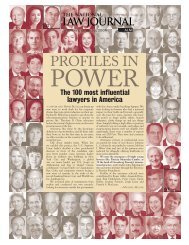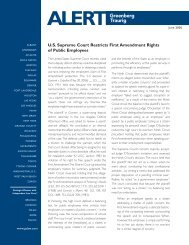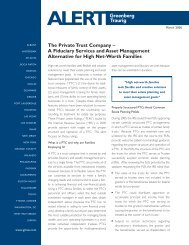recent developments in delaware corporate law - Greenberg Traurig ...
recent developments in delaware corporate law - Greenberg Traurig ...
recent developments in delaware corporate law - Greenberg Traurig ...
You also want an ePaper? Increase the reach of your titles
YUMPU automatically turns print PDFs into web optimized ePapers that Google loves.
210 De<strong>law</strong>are Law Review Volume 7:2<br />
requirements. Nevertheless, the Court of Chancery repeatedly emphasized that such claims<br />
are difficult to plead and prove.<br />
Rather than limit director protections, a number of <strong>recent</strong> decisions (some reviewed<br />
<strong>in</strong> past “Recent Developments” articles <strong>in</strong> this publication) have expanded director<br />
protections, for example, <strong>in</strong> the areas of <strong>in</strong>demnification and advancement, permitt<strong>in</strong>g<br />
directors to recover “fees for fees” on <strong>in</strong>demnification claims, 145 to forego mak<strong>in</strong>g a demand<br />
on the board of directors before su<strong>in</strong>g for <strong>in</strong>demnification, 146 to expedite actions for<br />
advancement or <strong>in</strong>demnification, 147 and to obta<strong>in</strong> mandatory <strong>in</strong>demnification when the<br />
director is “successful on the merits or otherwise,” notwithstand<strong>in</strong>g that his conduct may<br />
have been “motivated exclusively by personal greed.” 148<br />
Nor do the decisions <strong>in</strong> Krasner or Oracle represent a sea change <strong>in</strong> the <strong>law</strong><br />
regard<strong>in</strong>g special committees, as some suggest. Rather, the court <strong>in</strong> both cases relied on<br />
well-established authority <strong>in</strong> reach<strong>in</strong>g their conclusions. The outcomes <strong>in</strong> Krasner and<br />
Oracle were largely driven by (i) their procedural postures (at the plead<strong>in</strong>gs stage), (ii) the<br />
fact that the defendant directors — not the shareholder pla<strong>in</strong>tiffs — bore the burden of<br />
proof on the issue of the special committee’s <strong>in</strong>dependence and effectiveness, and (iii) their<br />
particular facts. (In Krasner, five of the seven directors who approved the merger were alleged<br />
to have disabl<strong>in</strong>g conflicts, and <strong>in</strong> Oracle, the committee members were asked to<br />
decide whether to level serious charges of <strong>in</strong>sider trad<strong>in</strong>g aga<strong>in</strong>st their fellow directors with<br />
whom they had material social ties.) In contrast, the dismissals <strong>in</strong> Martha Stewart and<br />
Guttman of shareholder claims were driven largely by the fact that the pla<strong>in</strong>tiffs failed to<br />
meet their burden to overcome a presumption of director <strong>in</strong>dependence and to sufficiently<br />
plead particularized facts establish<strong>in</strong>g a lack of director <strong>in</strong>dependence necessary to establish<br />
demand futility.<br />
In the wake of Krasner and Oracle, some have suggested that special committees<br />
are just not worth it. They question whether a possible shift <strong>in</strong> the burden of persuasion<br />
145. Stifel F<strong>in</strong>. Corp. v. Cochran, 809 A.2d 555 (Del. 2002).<br />
146. Id.<br />
147. Bergonzi v. Rite Aid Corp., C.A. No. 20453, 2003 WL 22407303 (Del. Ch. Oct.<br />
20, 2003).<br />
148. Perconti v. Thornton Oil Corp., C.A. No. 18630, 2002 WL 982419, at *3 (Del. Ch.<br />
May 3, 2002) (“Dismissal of the charges aga<strong>in</strong>st Perconti by the government, for whatever reason,<br />
constituted ‘success.’”).



